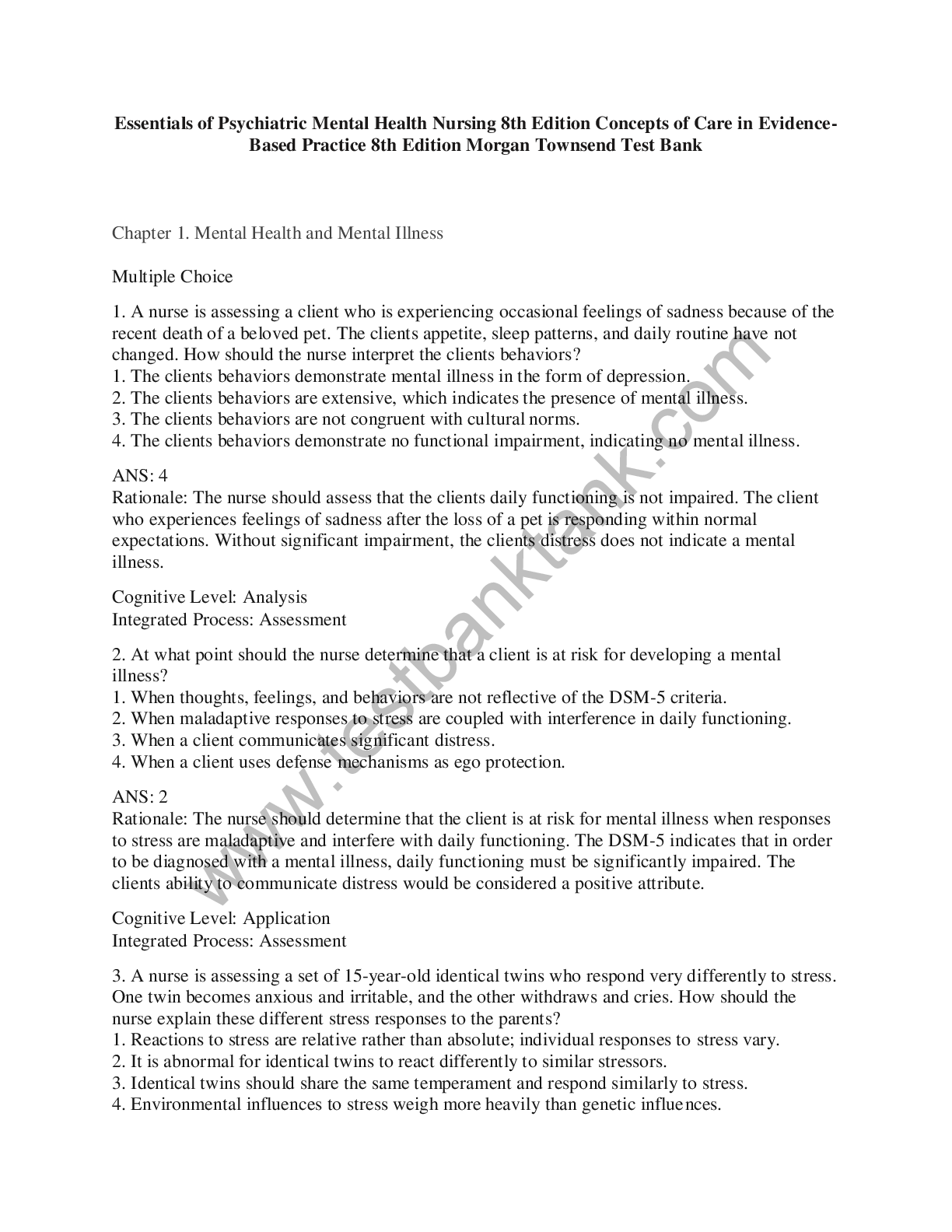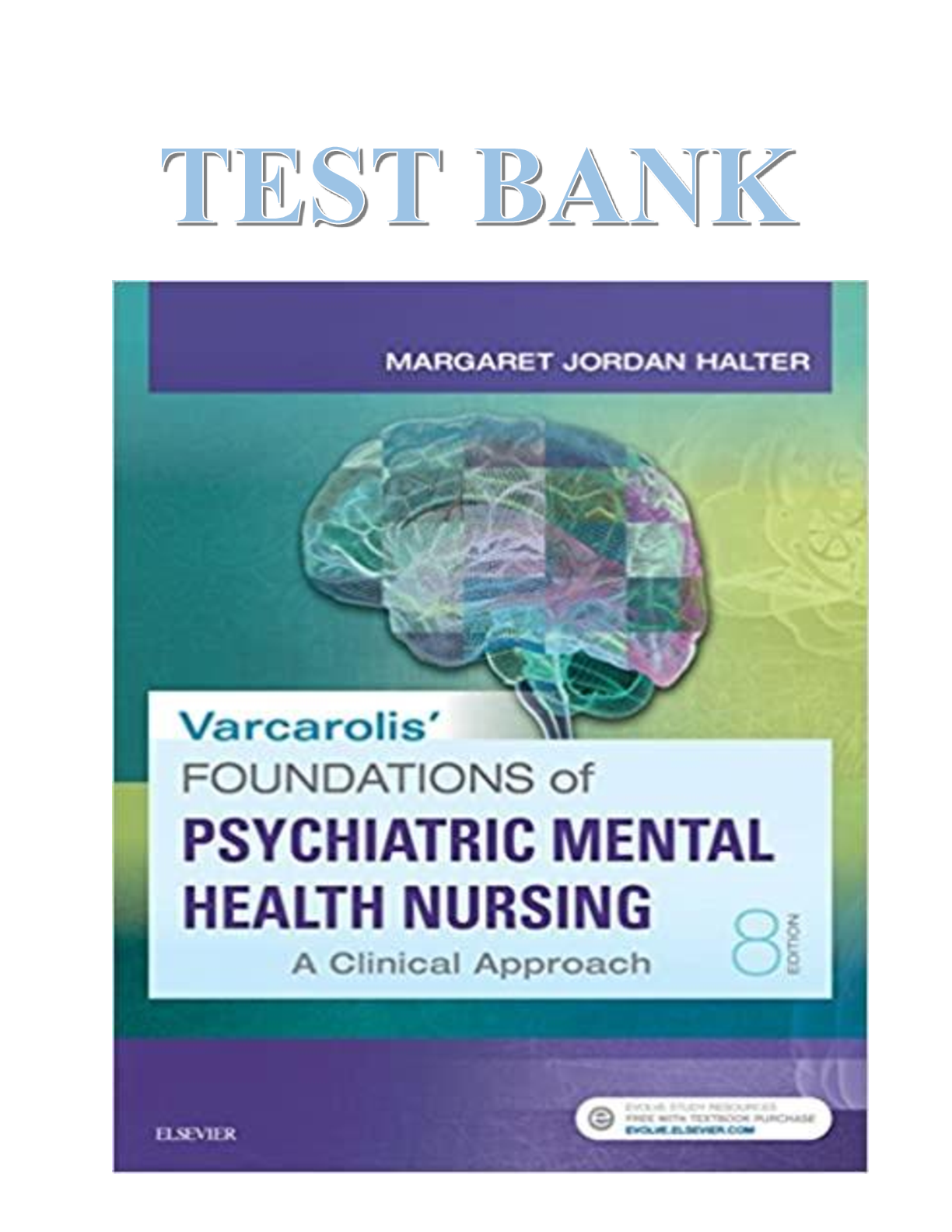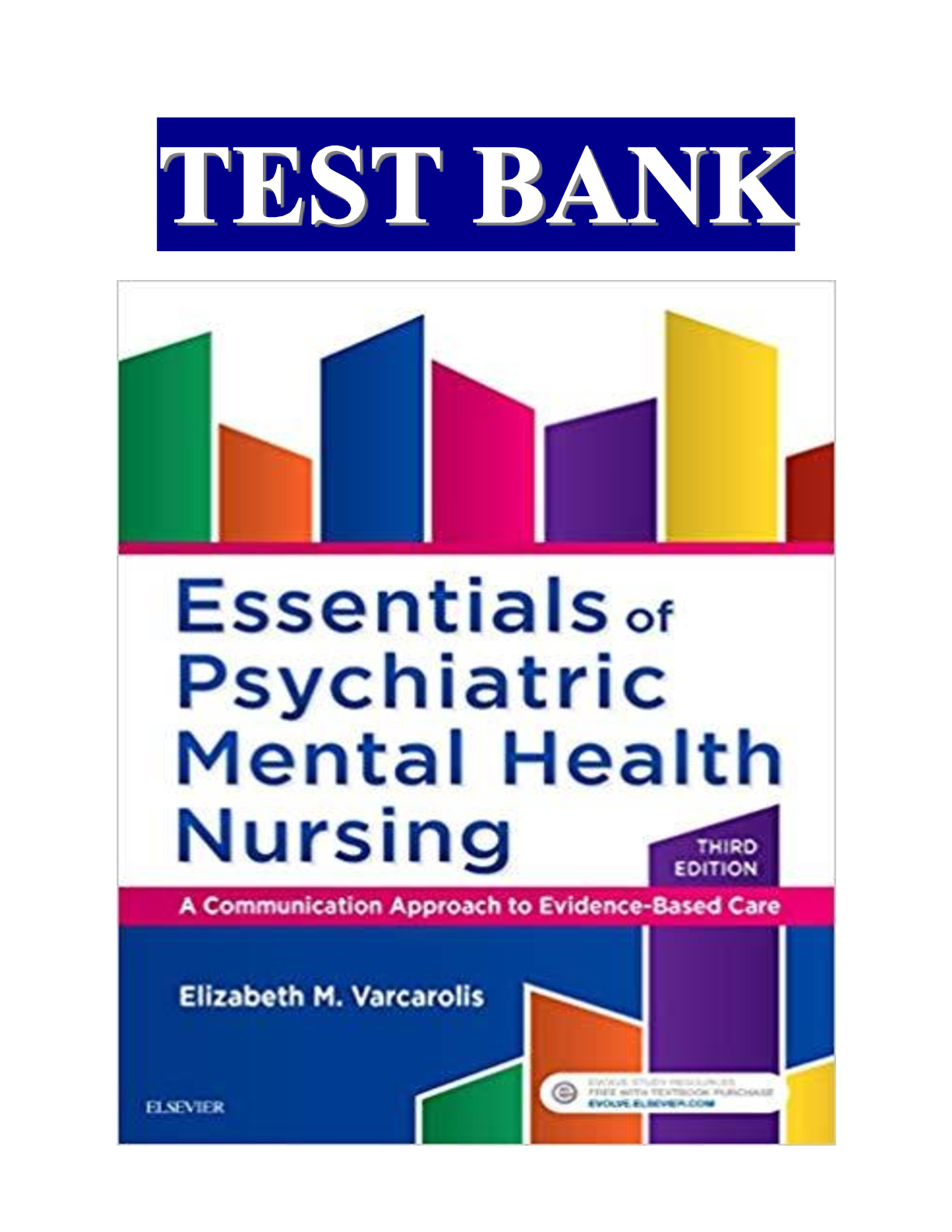*NURSING > QUESTIONS & ANSWERS > Varcarolis’ Foundations of Psychiatric Mental Health Nursing: A Clinical Approach, 8th Edition (All)
Varcarolis’ Foundations of Psychiatric Mental Health Nursing: A Clinical Approach, 8th Edition
Document Content and Description Below
A parent says, “My 2-year-old child refuses toilet training and shouts ‘No!’ when given directions. What do you think is wrong?” Select the nurse’s best reply. a. “Your child needs firme... r control. It is important to set limits now.” b. “This is normal for your child’s age. The child is striving for independence.” c. “There may be developmental problems. Most children are toilet trained by age 2.” d. “Some undesirable attitudes are developing. A child psychologist can help you develop a plan.” ANS: B This behavior is conventional of a child around the age of 2 years, whose developmental task is to develop autonomy. The distracters indicate the child’s behavior is abnormal. PTS: 1 DIF: Cognitive Level: Apply (Application) REF: Page 2-52 (Table 2-6) TOP: Nursing Process: Implementation MSC: Client Needs: Health Promotion and Maintenance 2. A nurse wants to find information on current evidence-based research, programs, and practices regarding mental illness and addictions. Which resource should the nurse consult? a. American Psychiatric Association b. American Psychological Association (APA) c. Clinician’s Quick Guide to Interpersonal Psychotherapy d. Substance Abuse and Mental Health Services Administration (SAMHSA) ANS: D The SAMHSA maintains a National Registry of Evidence-based Practices and Programs. New therapies are entered into the database on a regular basis. The incorrect responses are resources but do not focus on evidence-based information. PTS: 1 DIF: Cognitive Level: Understand (Comprehension) REF: Page 2-32 TOP: Nursing Process: Planning MSC: Client Needs: Management of Care 3. A 26-month-old displays negative behavior, refuses toilet training, and often says, “No!” Which psychosocial crisis is evident? a. Trust versus mistrust b. Initiative versus guilt c. Industry versus inferiority d. Autonomy versus shame and doubt ANS: D The crisis of autonomy versus shame and doubt relates to the developmental task of gaining control of self and environment, as exemplified by toilet training. This psychosocial crisis occurs during the period of early childhood. Trust versus mistrust is the crisis of the infant. Initiative versus guilt is the crisis of the preschool and early-school-aged child. Industry versus inferiority is the crisis of the 6- to 12-year-old child. PTS: 1 DIF: Cognitive Level: Understand (Comprehension) REF: Page 2-52 (Table 2-6) TOP: Nursing Process: Assessment MSC: Client Needs: Health Promotion and Maintenance 4. A 4-year-old grabs toys from other children and says, “I want that now!” From a psychoanalytic perspective, this behavior is a product of impulses originating in which system of the personality? a. Id b. Ego c. Superego d. Preconscious ANS: A The id operates on the pleasure principle, seeking immediate gratification of impulses. The ego acts as a mediator of behavior and weighs the consequences of the action, perhaps determining that taking the toy is not worth the mother’s wrath. The superego would oppose the impulsive behavior as “not nice.” The preconscious is a level of awareness rather than an aspect of personality. PTS: 1 DIF: Cognitive Level: Understand (Comprehension) REF: Pages 2-4, 5 TOP: Nursing Process: Assessment MSC: Client Needs: Health Promotion and Maintenance 5. The parent of a 4-year-old rewards and praises the child for helping a sibling, being polite, and using good manners. These qualities are likely to be internalized and become part of which system of the personality? a. Id b. Ego c. Superego d. Preconscious ANS: C The superego contains the “shoulds,” or moral standards internalized from interactions with significant others. Praise fosters internalization of desirable behaviors. The id is the center of basic instinctual drives, and the ego is the mediator. The ego is the problem-solving and reality-testing portion of the personality that negotiates solutions with the outside world. The preconscious is a level of awareness from which material can be retrieved easily with conscious effort. This item relates to an audience response question. PTS: 1 DIF: Cognitive Level: Understand (Comprehension) REF: Pages 2-4, 5 TOP: Nursing Process: Implementation MSC: Client Needs: Health Promotion and Maintenance 6. A nurse supports a parent for praising a child who behaves in helpful ways to others. When this child behaves with politeness and helpfulness in adulthood, which feeling will most likely result? a. Guilt b. Anxiety c. Humility d. Self-esteem ANS: D The individual will be living up to the ego ideal, which will result in positive feelings about self. The other options are incorrect because each represents a negative feeling. PTS: 1 DIF: Cognitive Level: Understand (Comprehension) REF: Pages 2-4, 5 TOP: Nursing Process: Implementation MSC: Client Needs: Health Promotion and Maintenance 7. An adult says, “I never know the answers,” and “My opinion does not count.” Which psychosocial crisis was unsuccessfully resolved for this adult? a. Initiative versus guilt b. Trust versus mistrust c. Autonomy versus shame and doubt d. Generativity versus self-absorption ANS: C These statements show severe self-doubt, indicating that the crisis of gaining control over the environment was not met successfully. Unsuccessful resolution of the crisis of initiative versus guilt results in feelings of guilt. Unsuccessful resolution of the crisis of trust versus mistrust results in poor interpersonal relationships and suspicion of others. Unsuccessful resolution of the crisis of generativity versus self-absorption results in self-absorption that limits the ability to grow as a person. PTS: 1 DIF: Cognitive Level: Understand (Comprehension) REF: Page 2-52 (Table 2-6) TOP: Nursing Process: Assessment MSC: Client Needs: Health Promotion and Maintenance 8. Which statement by a patient would lead the nurse to suspect unsuccessful completion of the psychosocial developmental task of infancy? a. “I know how to do things right, so I prefer jobs where I work alone rather than on a team.” b. “I do not allow other people to truly get to know me.” c. “I depend on frequent praise from others to feel good about myself.” d. “I usually need to do things several times before I get them right.” ANS: B According to Erikson, the developmental task of infancy is the development of trust. The correct response is the only statement clearly showing lack of ability to trust others. An inability to work with others, coupled with a sense of superiority, suggests unsuccessful completion of the task of intimacy versus isolation. Relying on praise from others suggests unsuccessful completion of the task of identity versus role confusion. Shame suggests failure to resolve the crisis of initiative versus guilt. PTS: 1 DIF: Cognitive Level: Analyze (Analysis) REF: Pages 2-28, 29, 52 (Table 2-6) TOP: Nursing Process: Assessment MSC: Client Needs: Health Promotion and Maintenance 9. A patient is suspicious and frequently manipulates others. To which psychosexual stage do these traits relate? a. Oral b. Anal c. Phallic d. Genital ANS: A The behaviors in the stem develop as the result of attitudes formed during the oral stage, when an infant first learns to relate to the environment. Anal-stage traits include stinginess, stubbornness, orderliness, or their opposites. Phallic-stage traits include flirtatiousness, pride, vanity, difficulty with authority figures, and difficulties with sexual identity. Genital-stage traits include the ability to form satisfying sexual and emotional relationships with members of the opposite sex, emancipation from parents, a strong sense of personal identity, or the opposites of these traits. PTS: 1 DIF: Cognitive Level: Understand (Comprehension) REF: Pages 2-4, 5, 40 (Table 2-1) TOP: Nursing Process: Assessment MSC: Client Needs: Health Promotion and Maintenance 10. A patient expresses a desire to be cared for by others and often behaves in a helpless fashion. Which stage of psychosexual development is most relevant to the patient’s needs? a. Latency b. Phallic c. Anal d. Oral ANS: D Fixation at the oral stage sometimes produces dependent infantile behaviors in adults. Latency fixations often result in difficulty identifying with others and developing social skills, resulting in a sense of inadequacy and inferiority. Phallic fixations result in having difficulty with authority figures and poor sexual identity. Anal fixation sometimes results in retentiveness, rigidity, messiness, destructiveness, and cruelty. This item relates to an audience response question. PTS: 1 DIF: Cognitive Level: Understand (Comprehension) REF: Page 2-40 (Table 2-1) TOP: Nursing Process: Assessment MSC: Client Needs: Health Promotion and Maintenance [Show More]
Last updated: 1 year ago
Preview 1 out of 173 pages
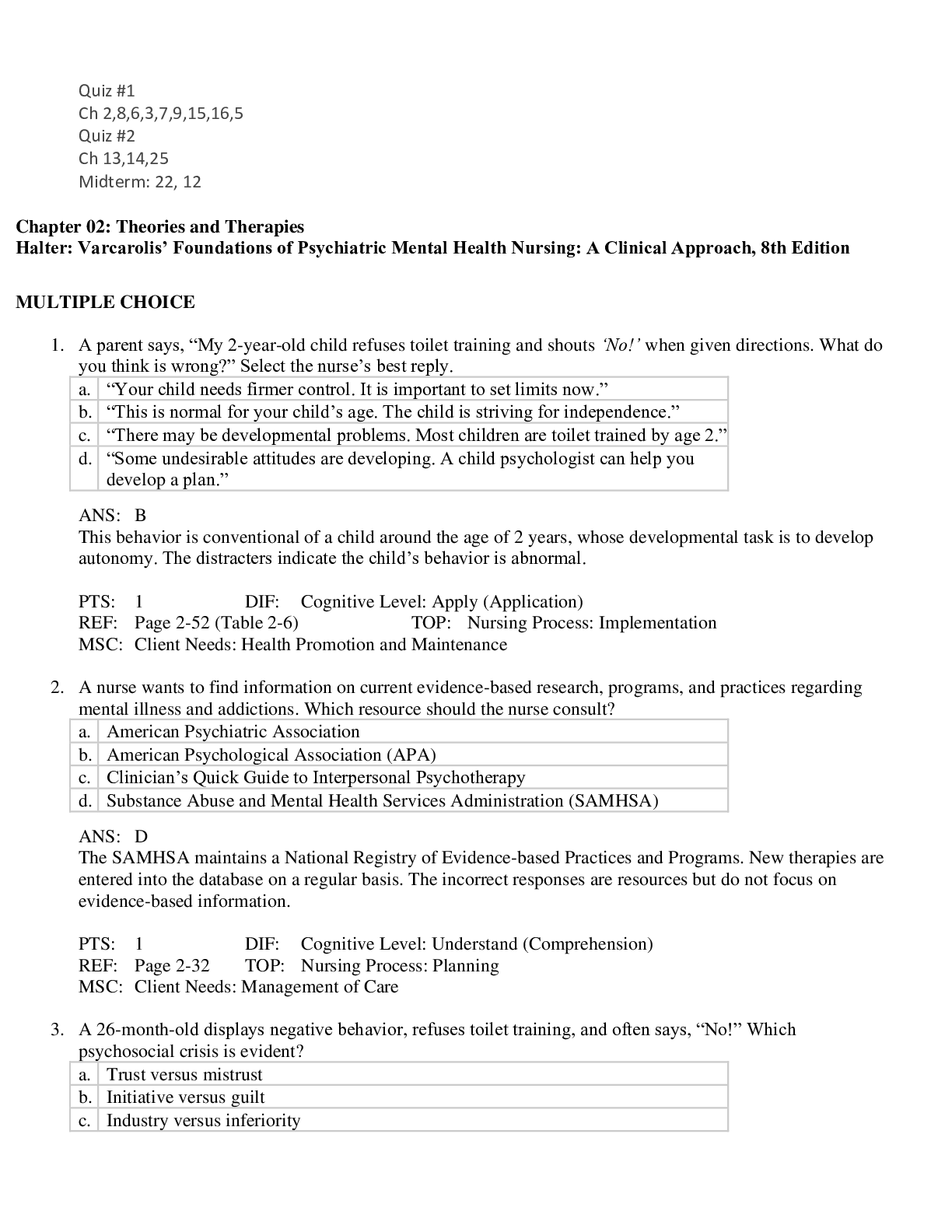
Reviews( 0 )
Document information
Connected school, study & course
About the document
Uploaded On
May 03, 2022
Number of pages
173
Written in
Additional information
This document has been written for:
Uploaded
May 03, 2022
Downloads
0
Views
43

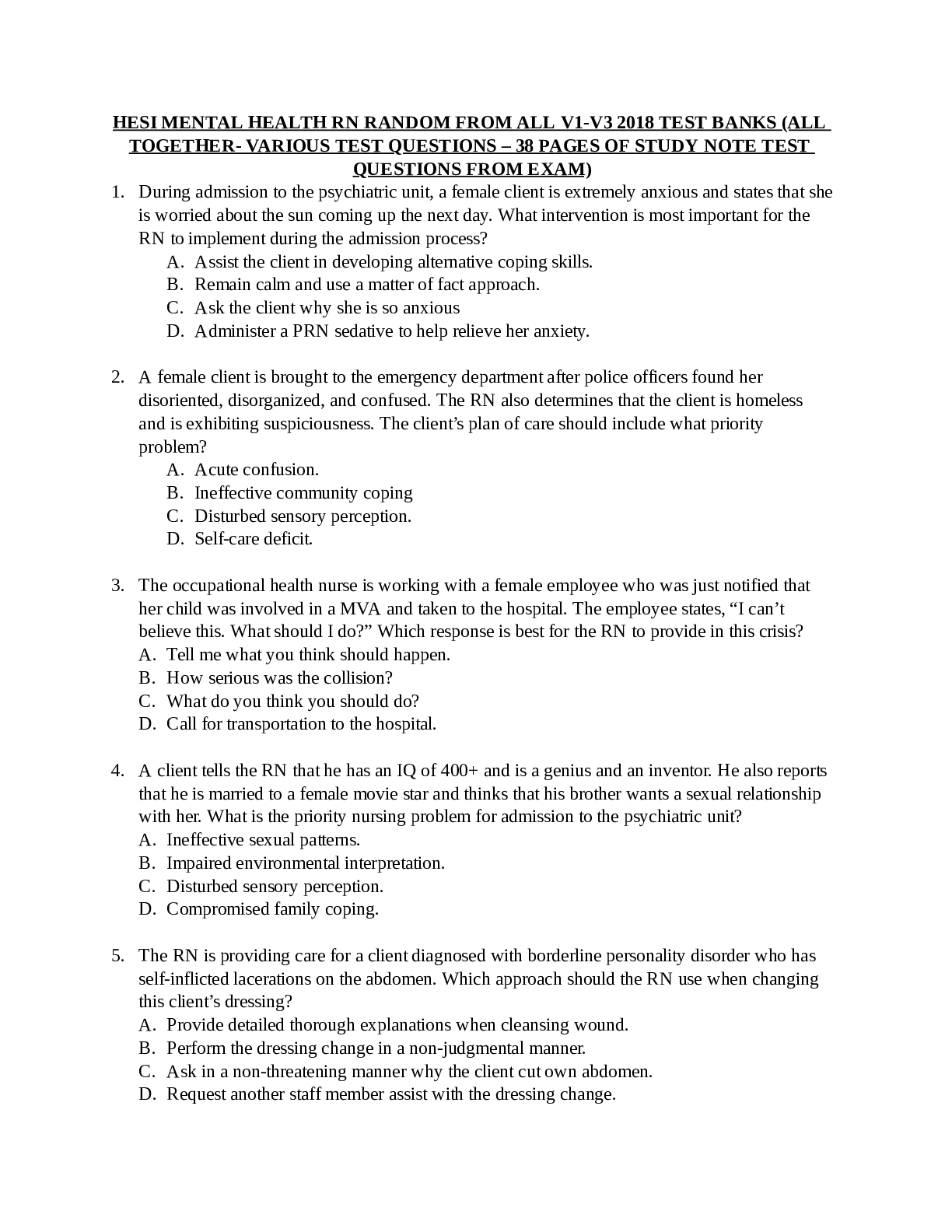
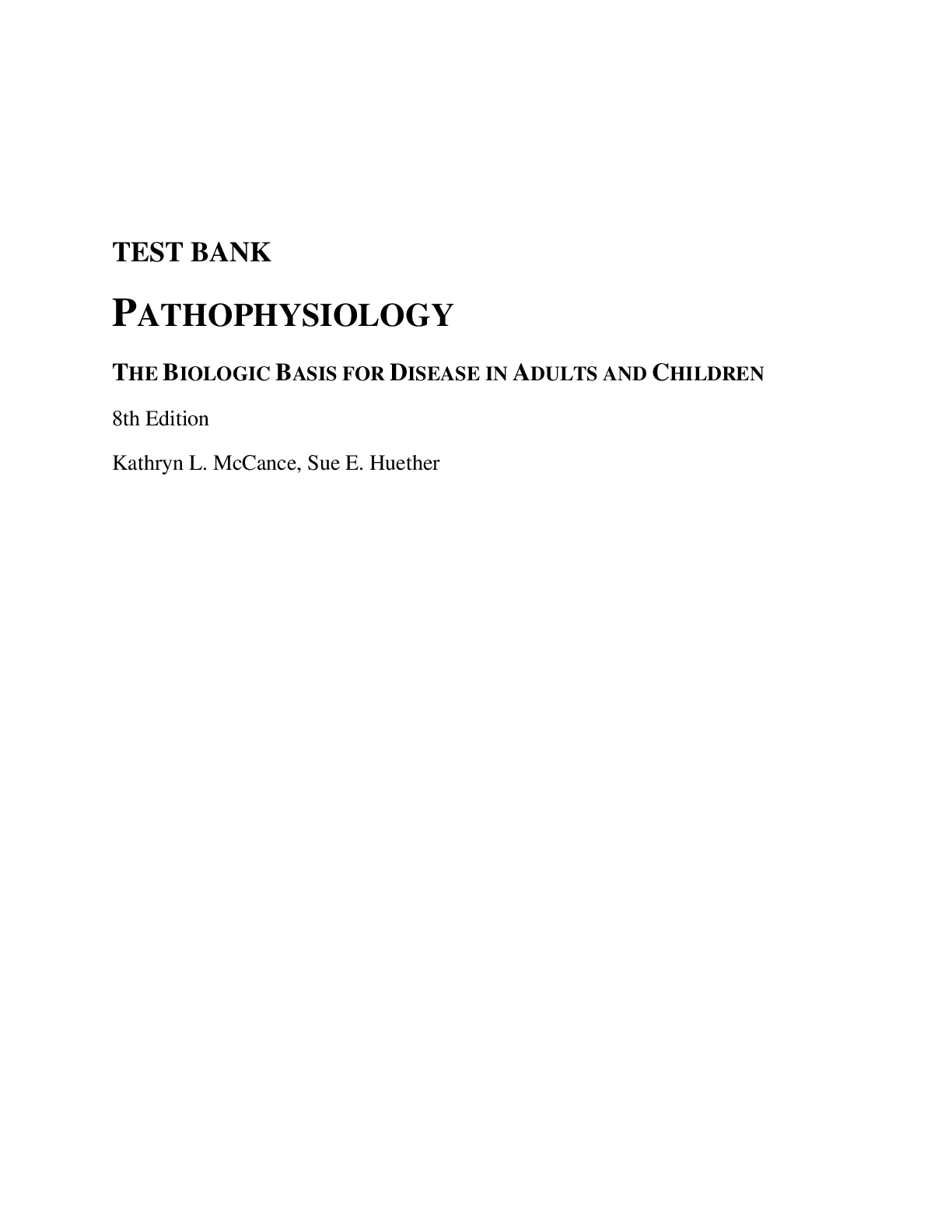
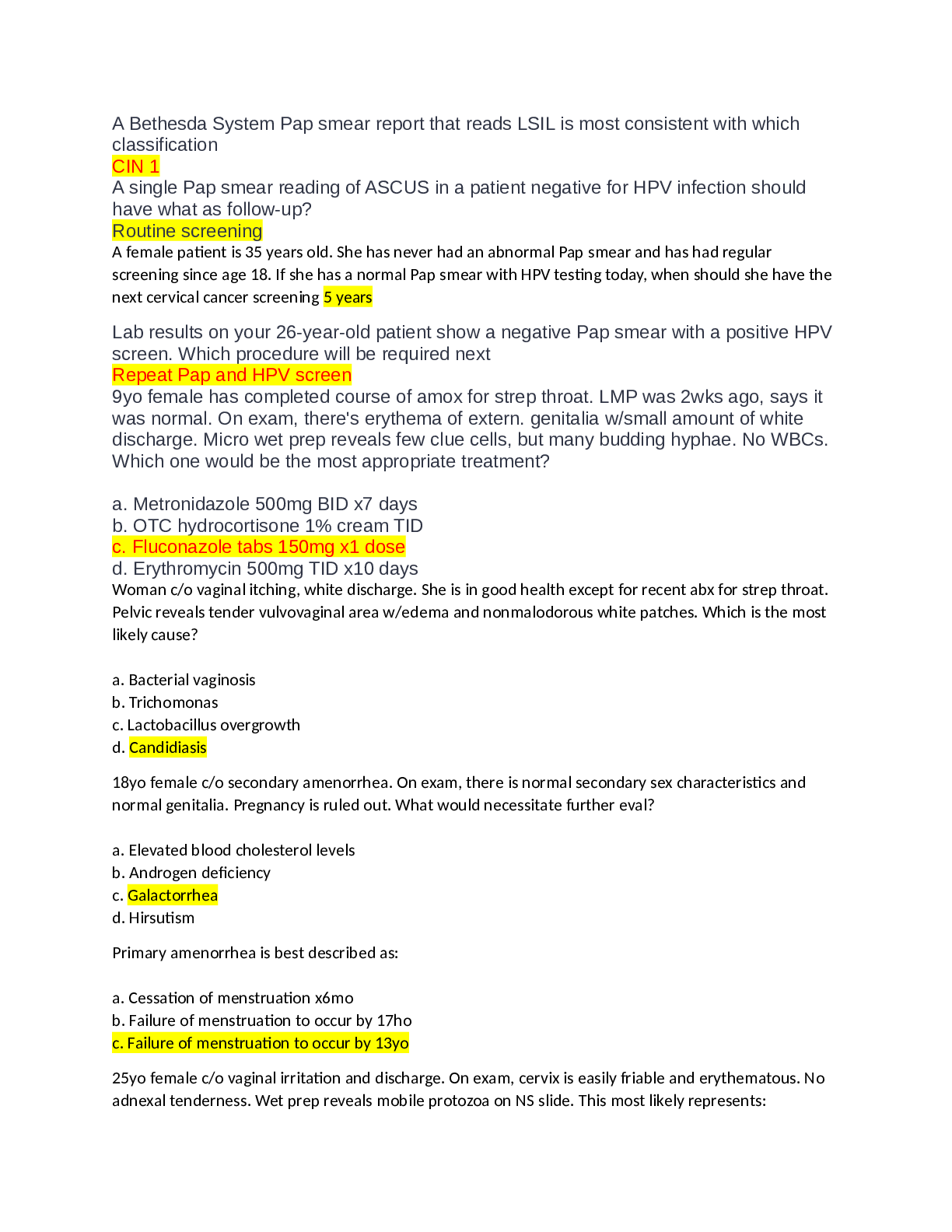
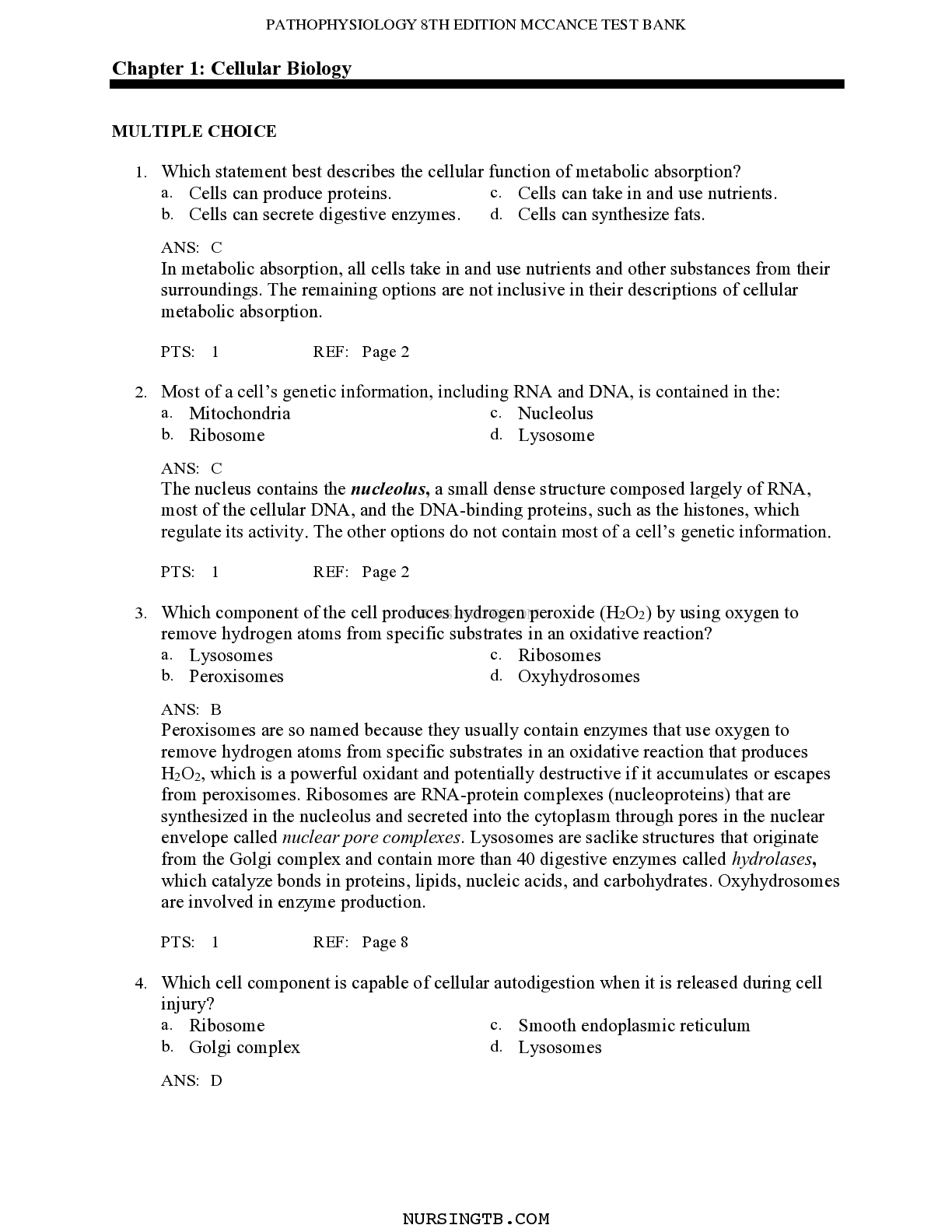
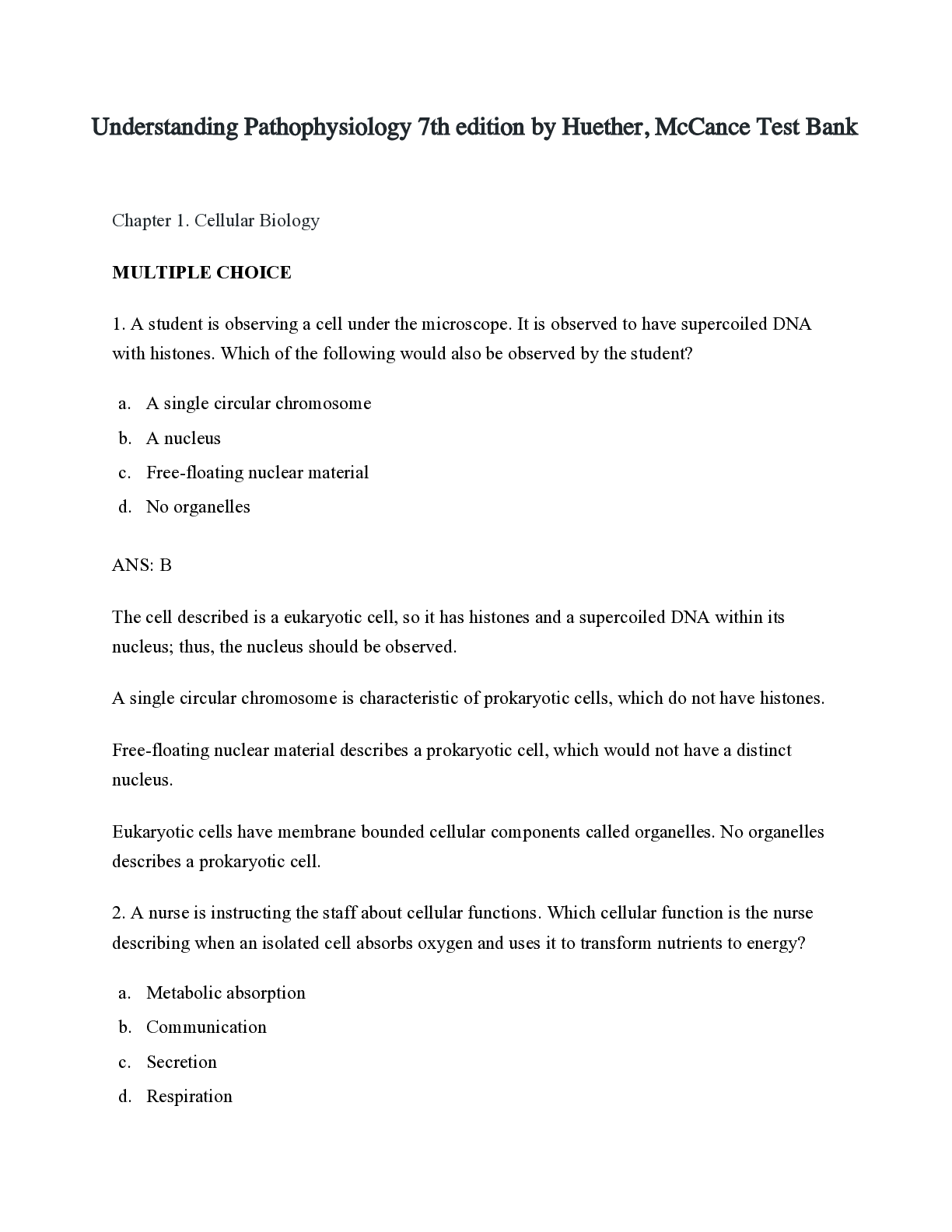
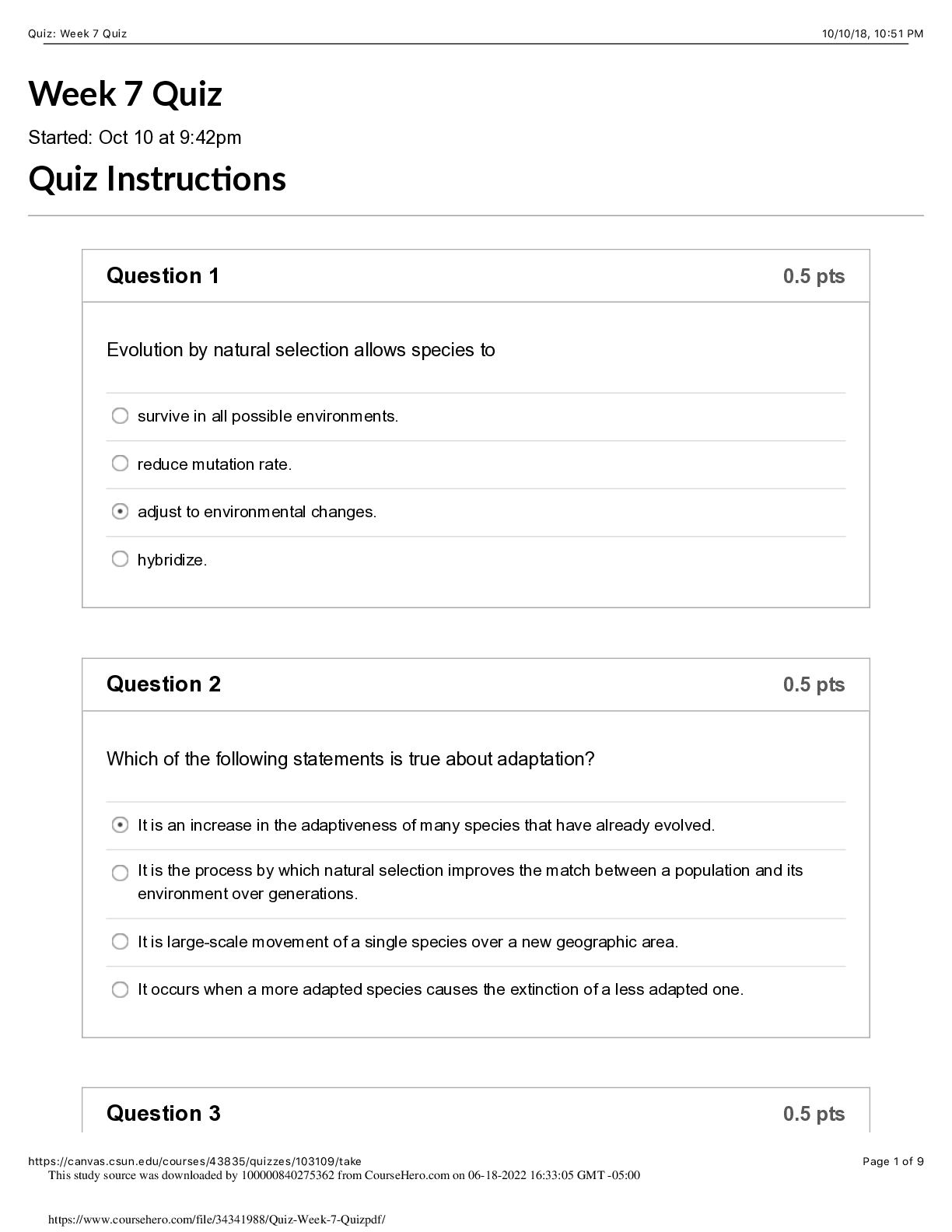
.png)
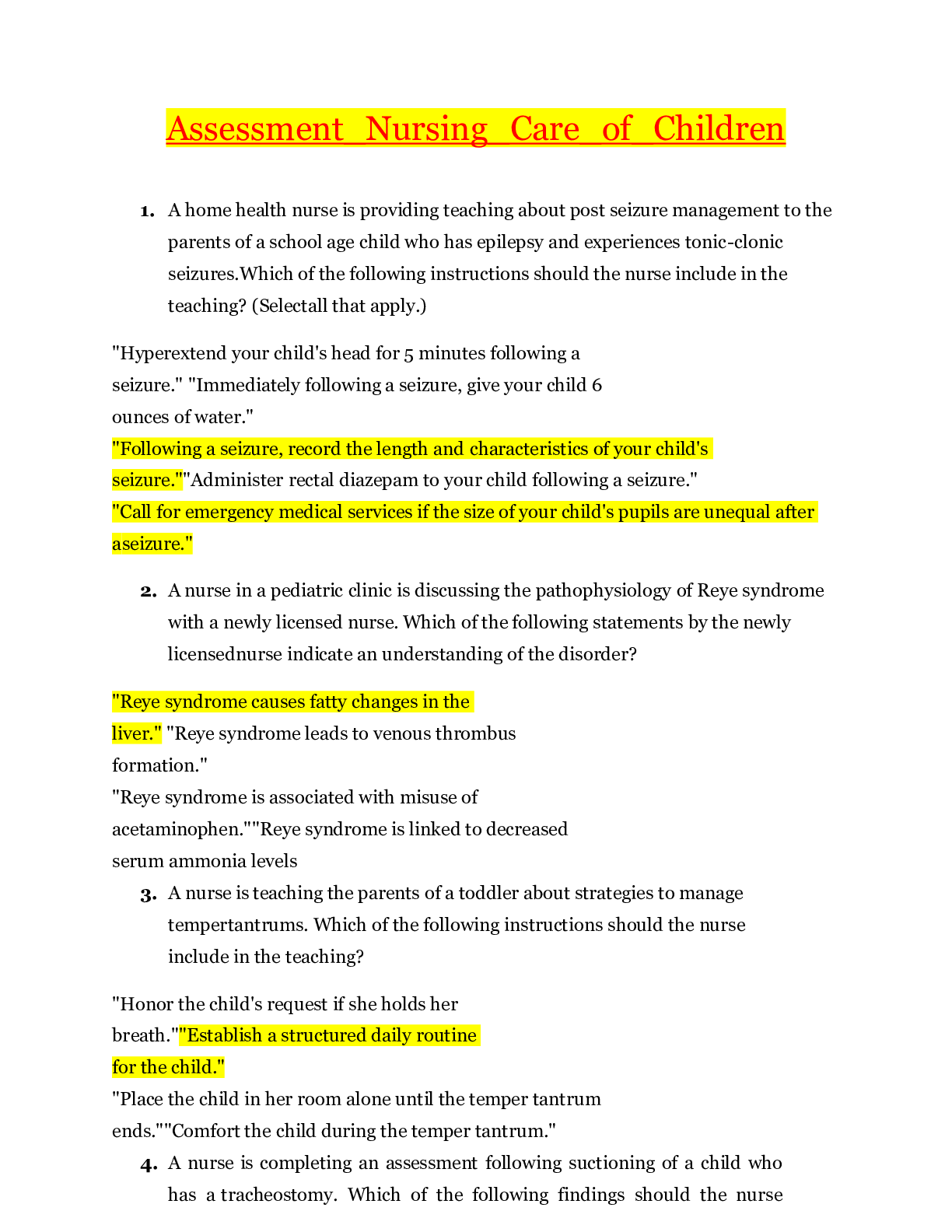
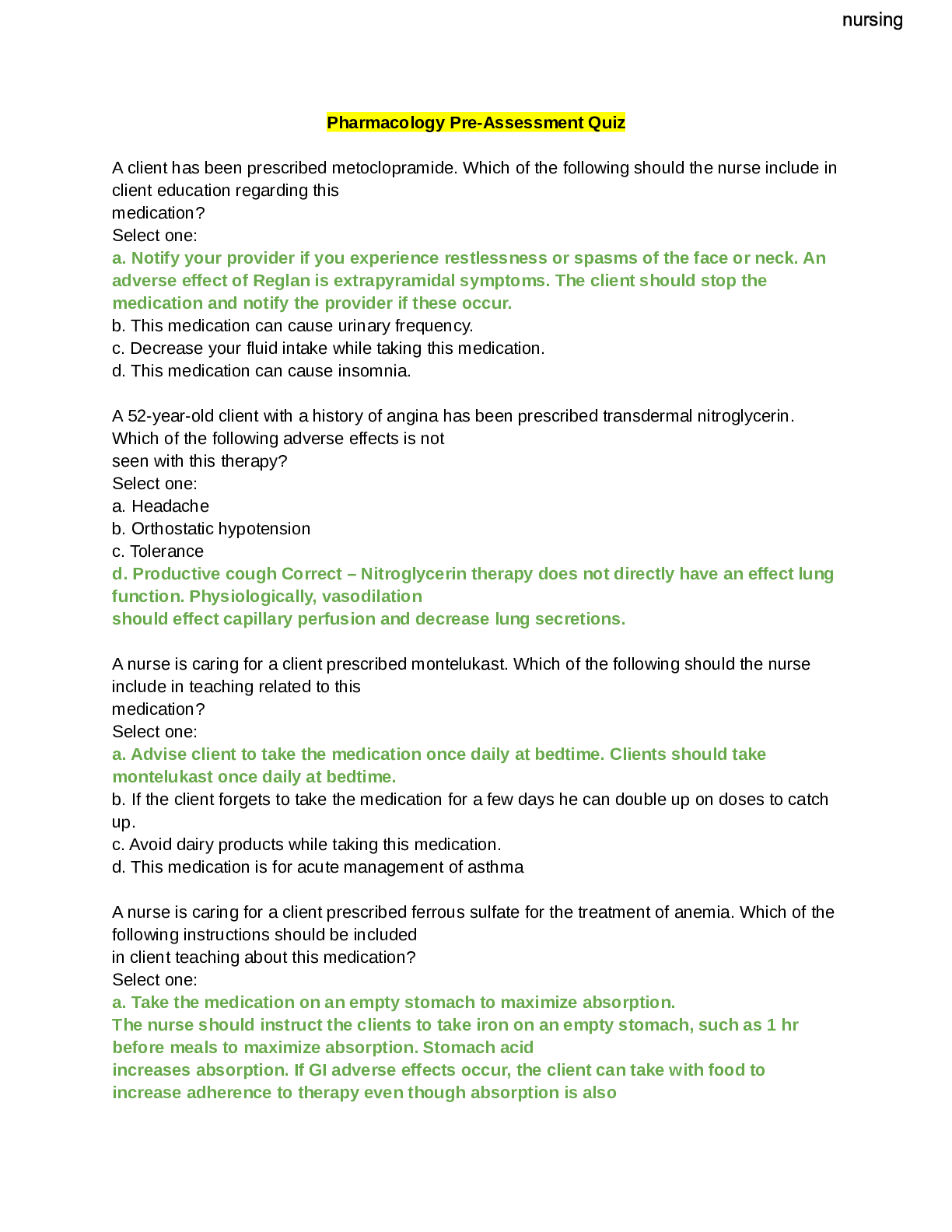
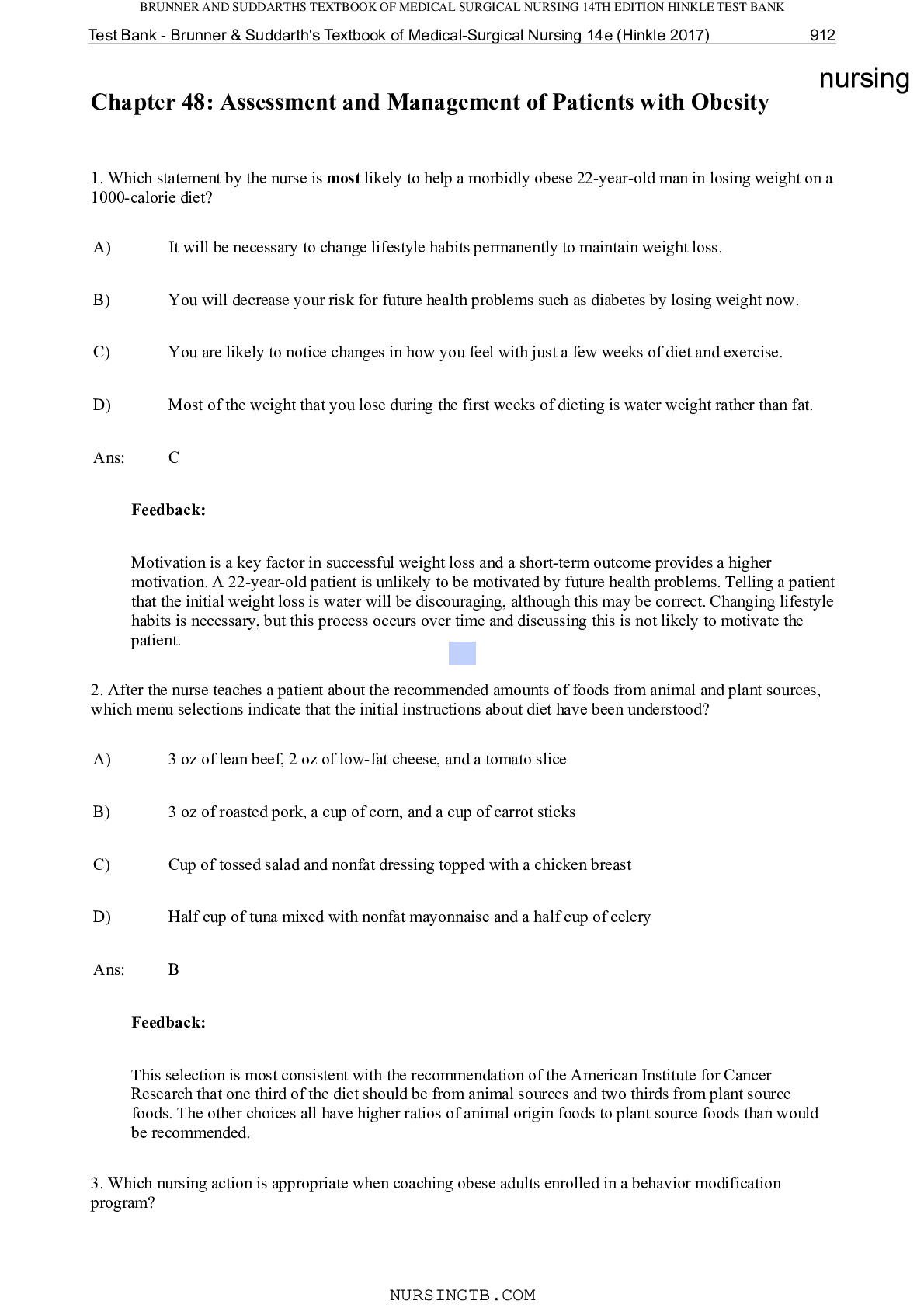
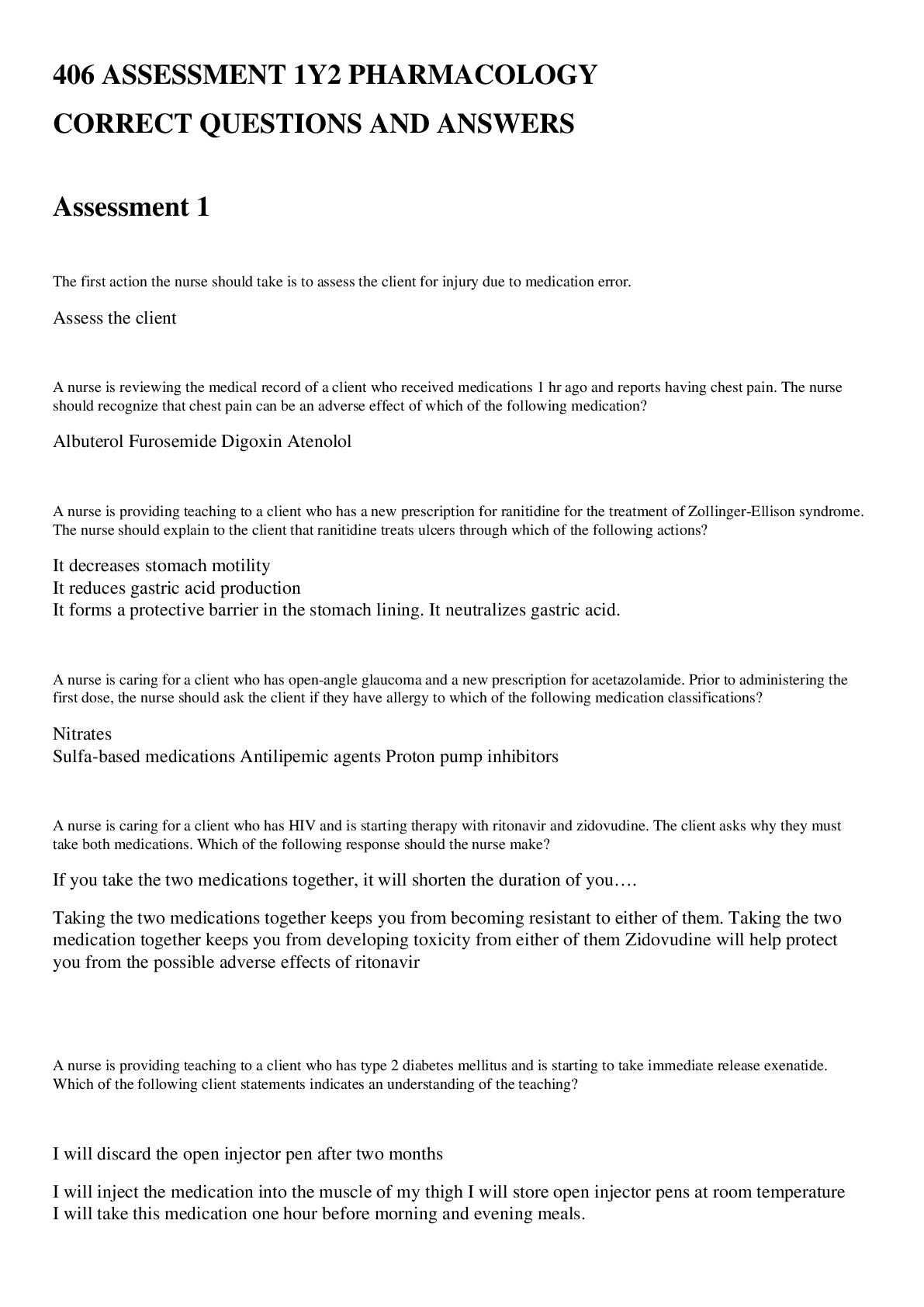
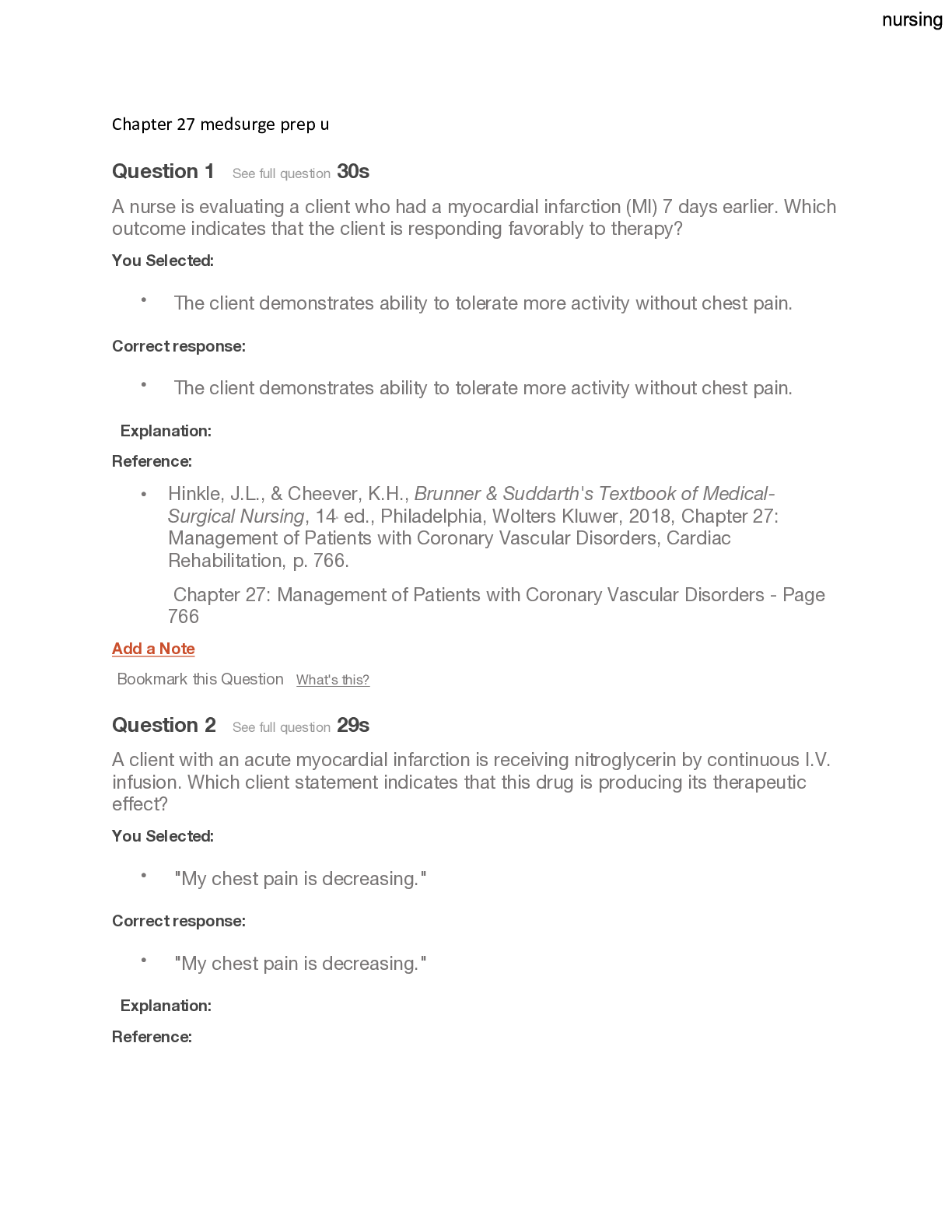
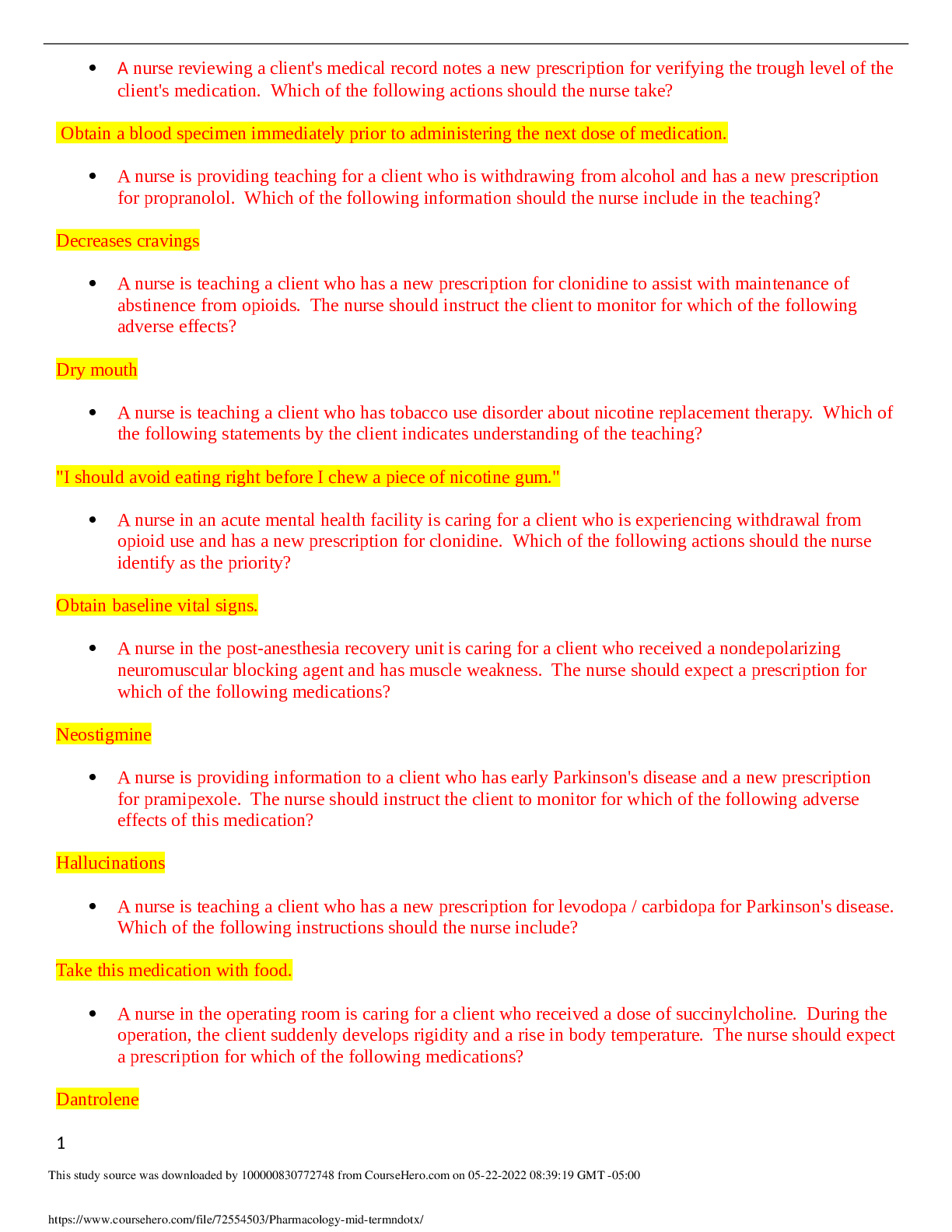
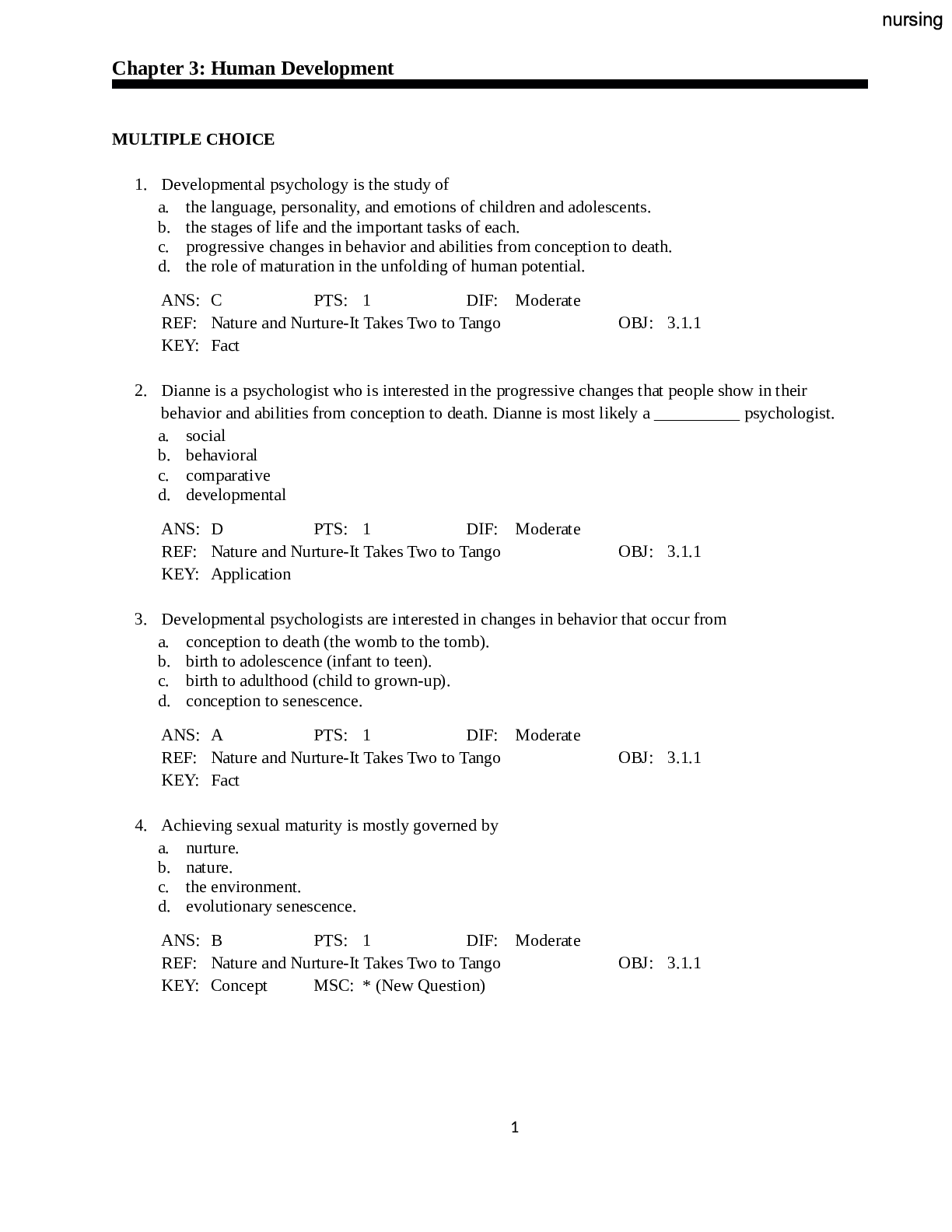



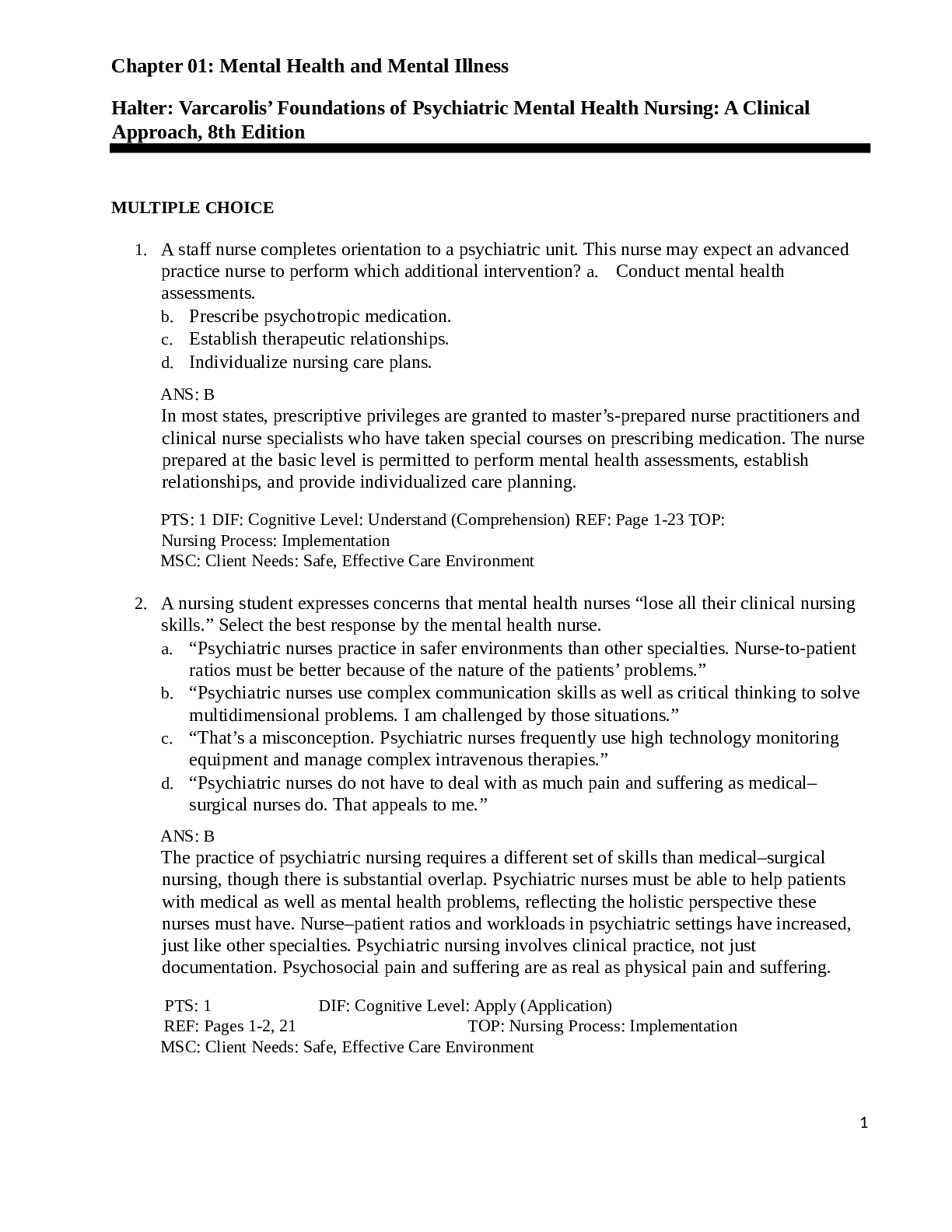
.png)

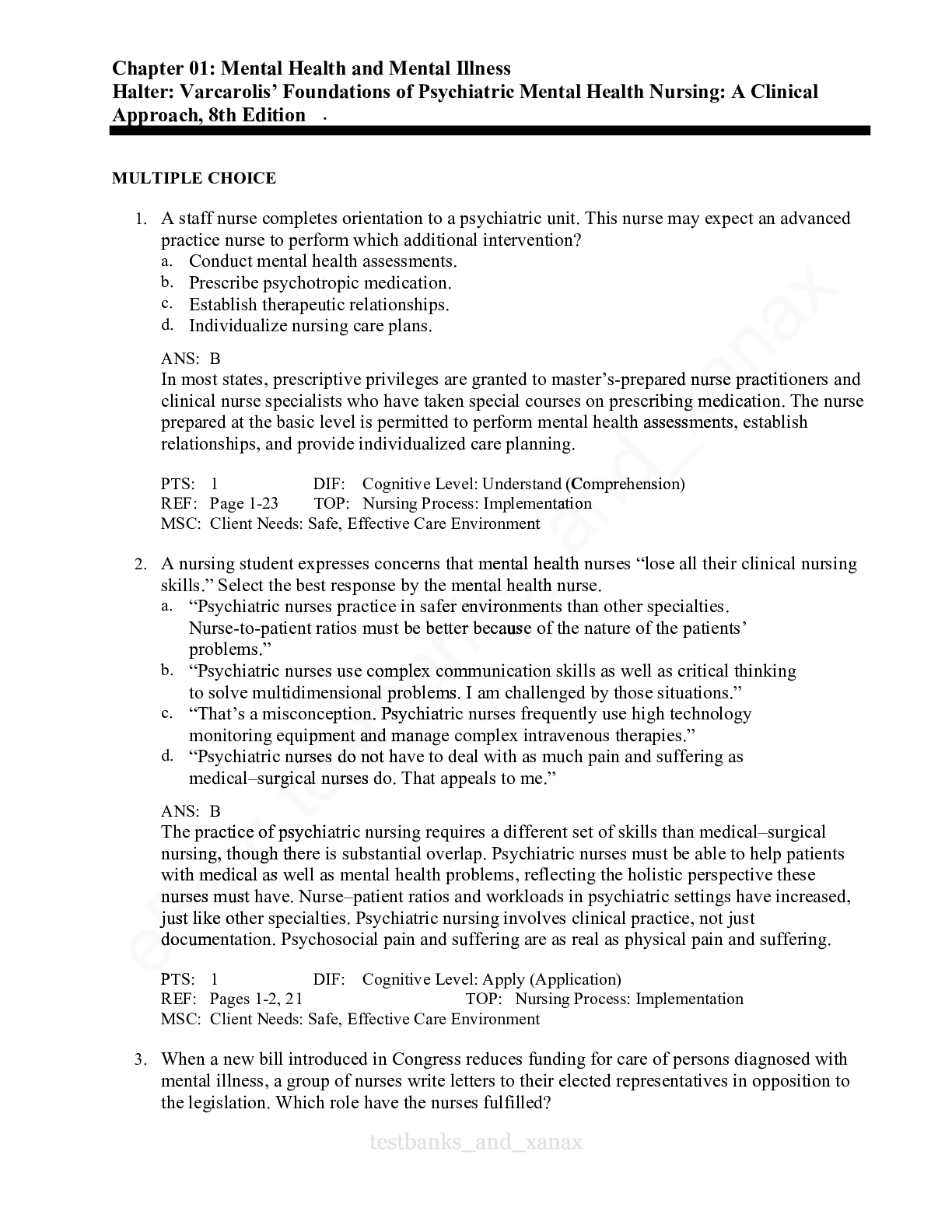

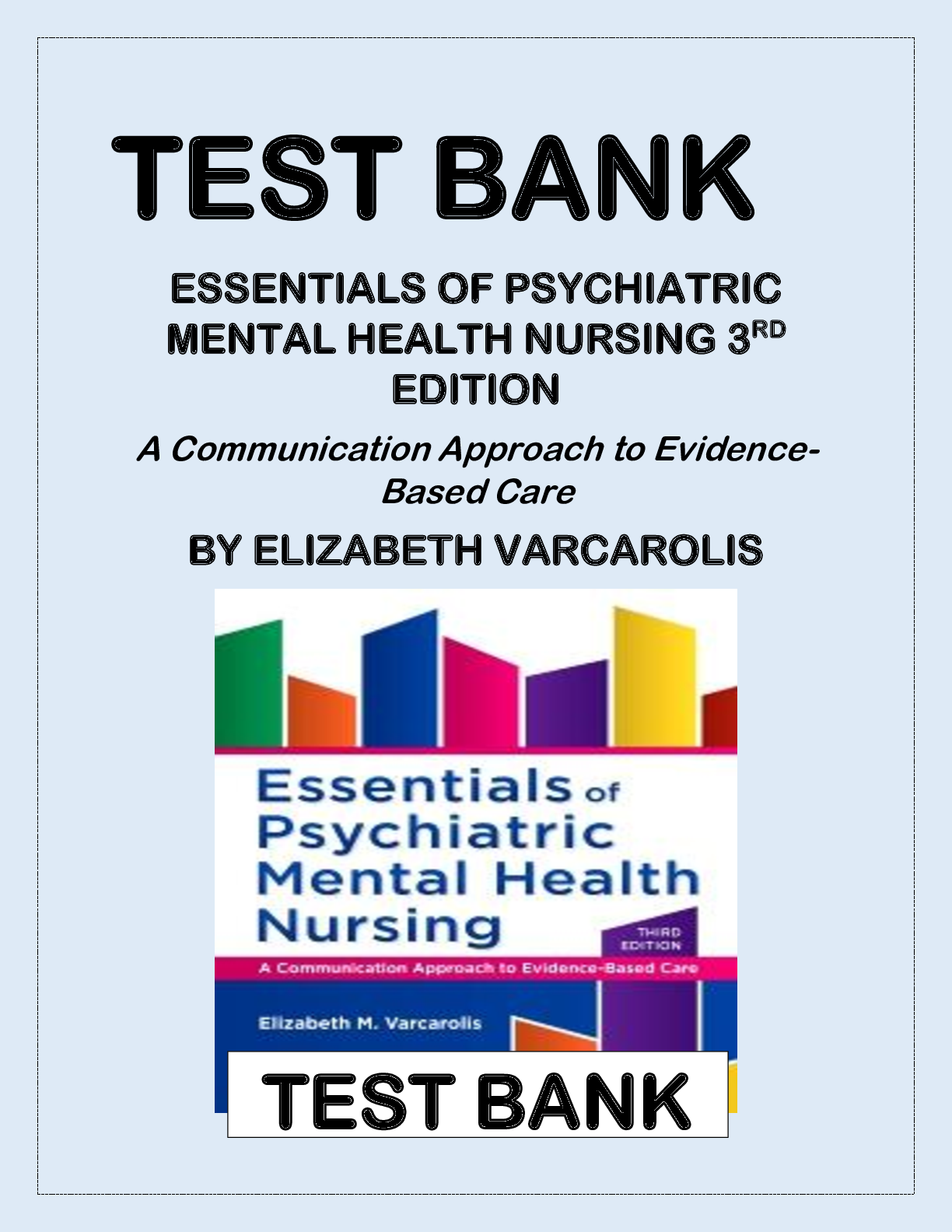
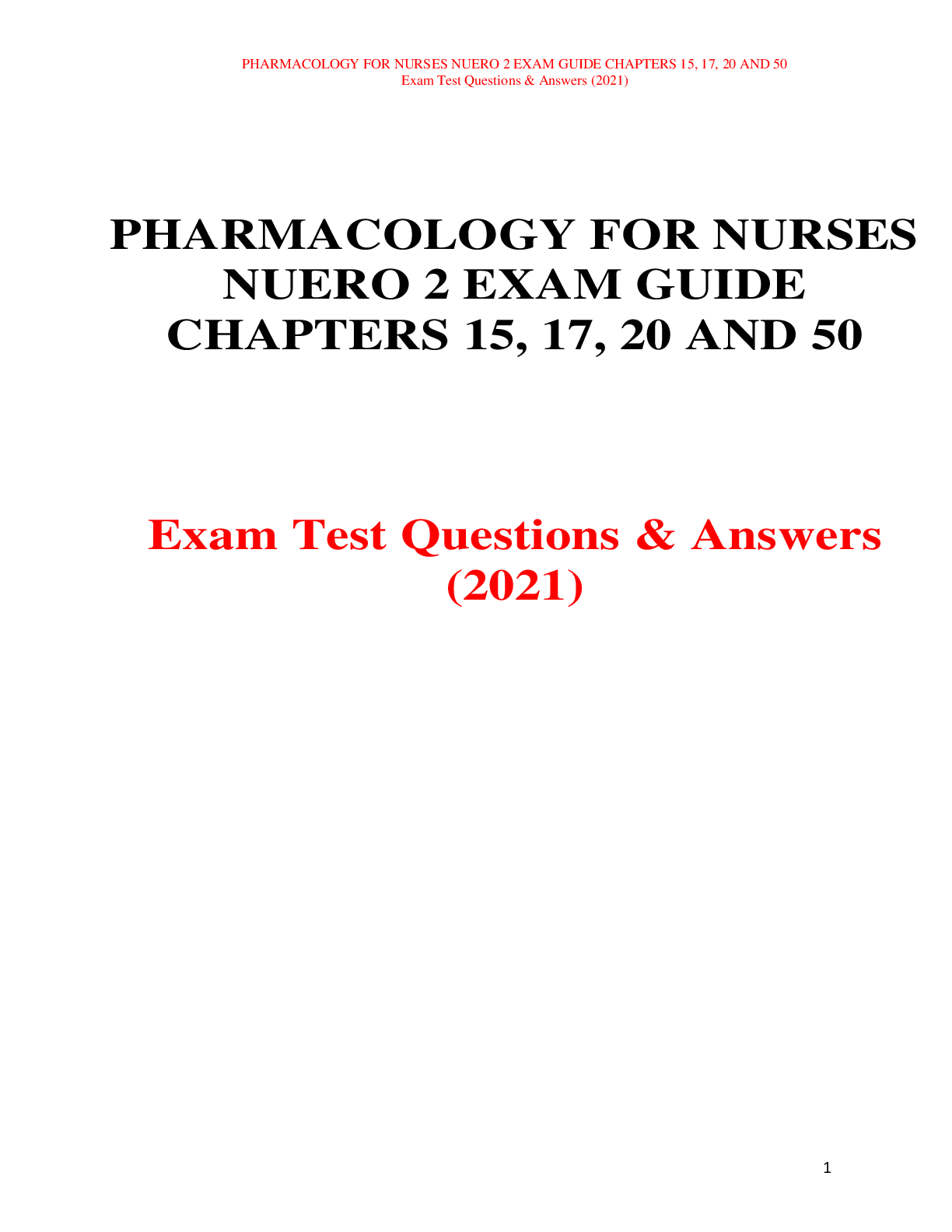
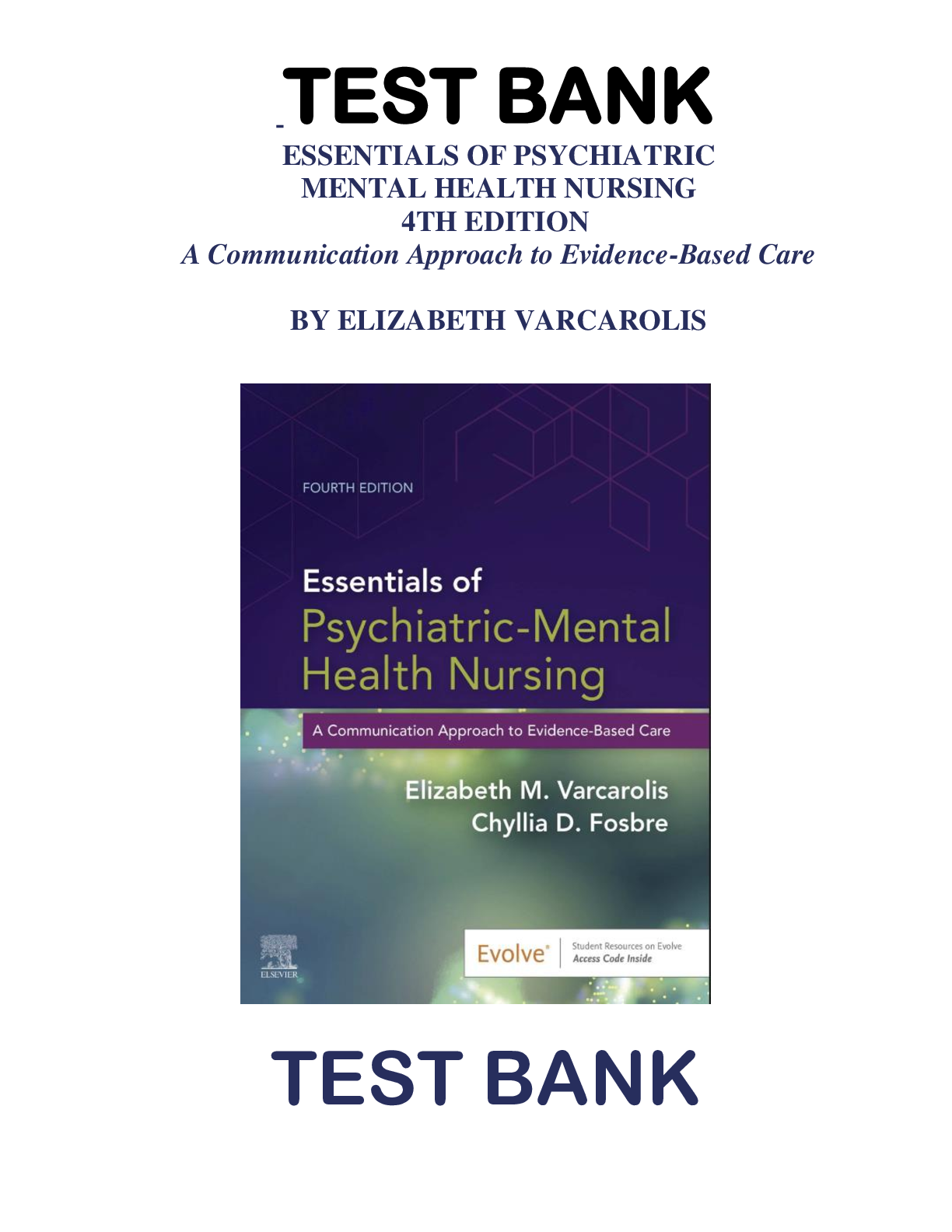
.png)
.png)
.png)

